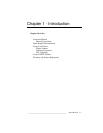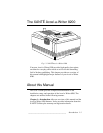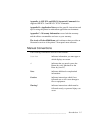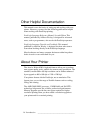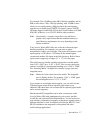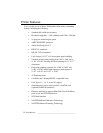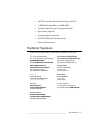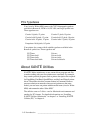_________________________________________ Introduction 1-7
For example, 20 to 28 MB provides 800 x 800 dpi capability and 40
MB or more offers 1200 x 1200 dpi printing. And, 16 MB or more
allows for oversized printing. (High resolution kits and memory
upgrades are available from XANTÉ. For details contact XANTÉ
Customer Support at 800-926-8393 in the US and Canada, at 95-800-
926-8393 in Mexico, or at 334-342-4846 in other countries.)
Note: Occasionally, a complex, large file or one with heavy
graphics may require more than the standard memory to
print. Memory requirements also vary depending on the
chosen resolution.
Your Accel-a-Writer 8200 offers out-of-the-box advanced paper
handling capability. For example, you can print on paper,
transparencies, labels, and envelopes. The printer also features a total
input capacity of 350 sheets—250 sheets in the standard paper
cassette and another 100 sheets in the fold down tray. Both of these
input sources support up to ledger (11" x 17")/A3 size paper.
The fold down tray handles variable custom and oversized media
from 3.90" x 5.80" up to 11.81" x 25.00". Plus, an extra wide print
option is available to expand paper handling up to 12.00" x 25.00".
See “Selecting Media” in chapter 6 for details on page sizes and
imageable areas.
Note: Media size is the actual size of the media. The imageable
area is slightly smaller. For example, 11.81" x 25.00" paper
has an imageable area of 11.73" x 24.93".
If you require an even higher input capacity, you can add a second
250 sheet input cassette with an optional paper feeder or an
additional 500 sheet letter size cassette with an optional paper feeder
and a cassette supporter.
Macintosh and PC/compatibles can be used concurrently on the
Accel-a-Writer 8200 with simultaneously active serial, parallel,
LocalTalk, and (optional) EtherTalk interfaces. You do not have to
send software commands or manually set hardware switches when a
different interface is used. In addition to PostScript, HP PCL 5 and
HP–GL emulations are supported for line printer and other
non-PostScript applications.



